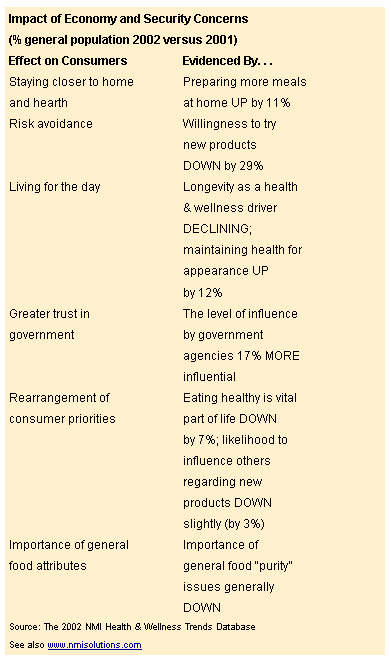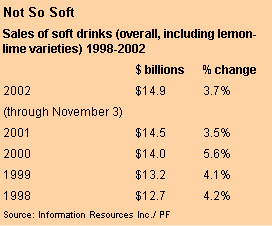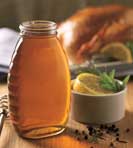
Encapsulated Choline
Encapsulated ingredients help enhance shelf life, improve end-product quality and assist in overcoming previously insurmountable processing challenges. Vitashure™ encapsulated ingredients provide formulation solutions when ingredient stabilization, taste masking or minimization of ingredient interactions is needed. The company has showed Vitashure USP-grade choline chloride in fortified chocolates as well as a choline-fortified cookie also containing folic acid. Balchem Encapsulates, Balchem Customer Service, 800-641-2001 (U.S.) or 845-355-5372 (overseas);bcpcustserv@balchem.com,www.balchem.com, Write in 000
Less Fat, Less Additives
New consumer trends create a demand for new products and solutions. Yo-Flex®, a new generation of yogurt cultures, offers exciting possibilities to dairies worldwide. Its most important characteristics include:Mild flavor: Yo-Flex cultures develop a very mild flavor and have high-texturing properties, which make it possible to reduce or even replace the use of additives like stabilizers or gelling agents.
High mouth feel in low-fat products: Yo-Flex cultures offer a high mouth feel and creaminess to low-fat products.
“We started out with screening completely new strains more than two years ago. In the ensuing research and development, we followed a strict step-by-step procedure, and at all stages employed our sensory panel and commercial partners. I am convinced this working partnership plays an important part in the market's very positive reception of the Yo-Flex cultures,” says Anne Charlotte Didriksen, marketing manager, Denmark. Chr. Hansen, Marilyn Stieve, sr. product manager for dairy, 800-558-0802, Mstieve@chr-hansen-us.com
New Pastry Flavors
Using pastry flavors in unusual applications such as beverages, snack bars, yogurt or pudding will intrigue adventurous consumers by the use of gourmet flavors in non-traditional applications. Robertet Flavors, Piscataway, N.J., has introduced a line of international flavor concepts that include Baklava, Biscotti, Danish, Éclair, Elephant Ears, Macaroons, Raspberry Danish and Tiramisu. With people always looking for the next exciting food, these flavors should offer manufacturers a myriad of possibilities. Robertet Flavors, Gretchen Schleck, 732-981-8300,RobertetFlavors@RobertetUSA.com
Sidebar: Making Lemons out of Lemon-Lime
Sales of lemon-lime soft drinks continue their three-year-long sales dive, and beverage makers appear desperate to reverse the troubling trend. How desperate? Enough to increase advertising and add the heretofore unthinkable caffeine, plus other tactics in the offing as the three major U.S. beverage companies strive to re-invigorate the lemon-lime area. Coca-Cola, Atlanta, is mulling an extension of Sprite, to be known as Sprite Tropical Remix. Not to be outdone, Pepsi, Purchase, N.Y., is set to boost distribution of its increasingly popular lemon-lime brand Sierra Mist. In perhaps the most-drastic move, Cadbury Schweppes', London, 7Up brand will be turned upside down with the addition of caffeine in its dnL lemon-lime offering. Will any work to offset the trend away from lemon-lime soft drinks?
One analyst, in particular, is wary, blaming the big beverage companies' lack of focus on the problems facing the category. Andrew Conway of Credit Suisse First Boston believes Sprite, in particular, is “tremendously underutilized.” Magnifying Sprite's troubles has been a lack of support from Coca-Cola. In key places like vending machines and convenience stores, Sprite has been forced to make way for new products like Vanilla Coke.

Nonetheless, Coke is aware of the need to turn Sprite around, but they have had little success doing so, even though the lemon-lime soft drink is Coca-Cola's third-biggest brand in the U.S. It holds 61.3% of the category, but Sprite is facing a declining market and increasingly stiff competition.
Coca-Cola's lemon-lime variety continues to the category, but its supermarket sales have dropped 4.2% this year. That is still better than 7Up, which has fallen 4.4% in its eighth consecutive year of declining sales. Sierra Mist's sales are up 2.2%, but it's availability is limited.
Pepsi plans for Sierra Mist to be a much bigger player in the category. A spokesperson believes the brand, which launched in late 2000, is set to grow into a “real contender” in the lemon-lime arena.
Increasing availability will fuel that growth, and Pepsi now has the brand nearly nationwide. It currently is found in 93% of the country, as opposed to somewhere near 60% just a few months ago. Furthermore, Sierra Mist will be expanded beyond just fountain locations in key markets. Atlanta, Minneapolis and New York are just a few of the places where canned and bottled versions of Pepsi's lemon-lime variety are making their debut.
The growth of Sierra Mist means the demise of 7Up in most of these markets. With that in mind, Dr Pepper/Seven Up, the U.S. unit of Cadbury Schweppes, is setting up new distribution networks for part of the 7Up brand. The launch of dnL, with its caffeine and different flavor, is another component of the company's plans to boost sales.
Kosher Emulsifiers
This company's line of Dur-Em® mono and diglycerides and Santone polyglycerol esters provides a wide range of product enhancements such as extended shelf life and improved texture, taste, volume and stability. The emulsifiers are available in plastic, bead, ivory, powder and flake form and are used in mixes, toppings, cakes and breads.
Loders Croklaan's, Channahon, Ill., research and development staff will help achieve the right emulsifier balance in all applications. All the company's emulsifiers are kosher. Loders Croklaan, 800-621-4710, www.croklaan.com
Delivering Organic
For over 70 years, Vegetable Juices, Inc. has provided products that deliver quality fresh flavors from natural sources of farm fresh produce. The company is certified by Oregon Tilth, and, for over a decade, has offered organic juices, purees, and diced/chopped items. These ingredients benefit beverages, sauces, dressings, and other food products. Vegetables such as: carrot, spinach, garlic, ginger, red pepper, and others can be processed. Vegetable Juices Inc. Steve Hvizdos at 708-924-9500Flavors for Cold Goodies
The line of flavors of frozen desserts presented by Virginia Dare, Brooklyn, N.Y., has been expanded to reach 223 different varieties. The SUPERFREEZE® line can be used in ice cream, frozen yogurt, water ice, ice milk and other frozen treats. A complete list is available by request from the company. Virginia Dare, fax: 718-768-3978,flavorinfo@virginiadare.comExtended Shelf Life; Reduced Costs
Extending shelf life and reducing ingredient costs are important issues for today's bakers. Aquasorb® Water Soluble Polymer Type A500 has a superior water binding capacity, helping extend product shelf life. The product holds water in the dough even during baking and continues to prevent water loss during shelf life. Another benefit is that Aquasorb helps to increase dough yield. Adding the product at a typical 1% use level can increase dough yield by as much as 8%, an effective way to reduce costs. Hercules Inc., Mary Hallock, 856-854-4160,mhallock@herc.comCocoa Powder Replacer
A new line of cocoa extenders has been introduced by David Michael & Co., Philadelphia, Pa., under the Cocoa-Mate brand. These customized flavors, which take into consideration both the type of cocoa and the total percentage of cocoa used in the finished product, are functionally capable of replacing up to 50% of the cocoa powder used in a finished food product. They are available as either N&A or artificial, liquid or powder. David Michael & Co., 800-DM-FLAVORS,www.dmflavors.comScientists Produce Heartier Rice
As weather patterns become more unpredictable, it is comforting to know scientists are taking measures to ensure our food supply remains safe.Scientists at Cornell University, Ithaca, N.Y., took six years to develop a heartier strain of rice. The rice plant has been engineered with natural sugar to make it acceptable to consumer palates, yet is acceptable to GMO critics because the rice genome itself was not adulterated.
The experimental rice is able to withstand drought, cold and salty water, and is certain to benefit farmers working in unfriendly weather patterns.
Non-GMO Starches
A line of identity preserved non-GMO specialty starches is available from National Starch Foodservice, Bridgewater, N.J. The company is listed in The Non-GMO Source, a directory that allows food manufacturers to locate suppliers of ingredients and products that are produced or formulated without GMOs.
National Starch Information Center, 800-797-4992, nscinquiry@salessupport.com, www.nationalstarch.com

Scientific Compendium on Honey
The National Honey Board, Longmont, Col., has published a collection of research studies on the benefits of honey, including insights into its positive effects on ulcers and antimicrobial properties. The 28-page document, “Honey—Health and Therapeutic Qualities,” explores the history of honey as well as presents information on new findings, such as honey as a source of energy. Conclusions in the compendium indicate honey offers many of the advantages that sports energy drinks and gels do.The natural sweetener also is being studied for its antioxidant properties, food preservation abilities, prebiotic properties and role in dental health.
The document is posted on the board's website at nhb.org/foodtech.
Alcoholic Beverage Stabilizer Approved
The Eastman Chemical Company, Kingsport, Tenn., has received notification from Health Canada, Health Products and Food Branch (HPFB) that its Sustane SAIB has been approved for use in citrus-flavored or spruce-flavored cocktail products. This includes beverages such as wine coolers, malt beverage coolers, and premixed liquid or solid cocktail products.This notification allows the product to be used as a stabilizer of flavoring oil emulsions used in alcoholic beverages at levels of up to 300 parts per million (ppm) of the finished beverage.
A beverage weighting agent, Sustane SAIB is used to increase the specific gravity of flavoring oils used in citrus beverages and sports drinks, giving increased stability to the finished beverage. Without weighting agents, citrus beverages would tend to separate, leaving a ring of flavoring oil on the surface. SAIB is odorless and flavorless at typical levels.
Sustane SAIB is virtually 100% sucrose acetate isobutyrate and is produced by Eastman under current good manufacturing practices for food ingredients. It is produced by the controlled esterification of natural sugar (sucrose) with acetic and isobutyric anhydrides. Sustane SAIB meets all specifications of the Joint Expert Committee on Food Additives and is manufactured under rabbinical supervision in full accordance with Jewish dietary laws. Eastman Chemical Company, Jan Stokes, 423-229-3420, stokes@eastman.com, www.eastman.com
Quality Vanilla, Competitively Priced
A pure vanilla extract that is made of only the highest-quality beans available from Madagascar and Indonesia offers a quality flavor and aroma at a competitive price. Rodelle's pure vanilla extract was first developed by a French family decades ago and was purchased by Custom Blending Inc., Fort Collins, Col., in 1984. The company states a New York testing lab has proved Rodelle's vanillin content—the flavor crystal extracted from the vanilla bean—to be above the national average. The products come in 4- and 8-oz. non-breakable plastic bottles, which are easier to ship and stock. Custom Blending, Melinda Marx, 970-482-8845
Oil Around the World
Archer Daniels Midland Company (ADM) has announced the launch of Enova brand cooking oil—a new cooking oil clinically shown to help with the fight against body fat and obesity.“Enova oil is an exciting and entirely new type of oil, the first and only cooking oil that can help millions of Americans with their struggle to maintain a healthy weight and fight obesity,” said G. Allen Andreas, chairman and chief executive. “It's also an example of ADM's corporate commitment to developing nature-based solutions for the pressing problems of the world.”
The product is to be marketed by ADM Kao LLC, a joint venture between ADM and the Kao Corporation of Japan formed in June 2001. Enova oil initially will be available in the Atlanta and Chicago metro regions, beginning as early as January 2003. To be sold in 20oz. bottles through grocery and other retail food stores, the product has been the subject of much anticipation in the food industry.
Developed in Japan by Kao, Enova oil was introduced as Healthy Econa Cooking Oil in Japan in 1999. It has since become the best-selling oil in the Japanese market. More than 15 years of research and numerous studies have indicated that the oil helps reduce both body weight and fat mass when used as part of sensible diet.
What the Oil Is
Beginning with all-natural soybean and canola oil, Enova oil is produced from a patented process that increases concentrations of diacylglycerol (DAG), a naturally occurring component found in all vegetable oils. In 2000, Kao successfully notified the FDA of the GRAS status for Enova oil.With its light taste, Enova oil can be substituted for ordinary cooking oils in salad dressing, home frying, baking and cooking—or in virtually any recipe in which vegetable oil is used. While Enova oil contains the same amount of calories and fat as conventional oils, it is metabolized differently. Because of its chemical structure, Enova oil is burned directly by the body as energy, rather than stored as fat. This means Enova oil may actually help people maintain or lose weight when included in a sensible diet.
A study recently completed by the Chicago Center for Clinical Research has shown that, over a 24-week period, people who incorporated Enova oil into a calorie-controlled diet reduced their weight by an average of 3.6%, and their body fat mass by 8.3%. Studies also have shown that Enova oil can help reduce post-meal serum triglycerides by 30 to 50%.
Manufacturing and Marketing
Enova oil is currently being produced in Decatur, Ill. In addition, ADM Kao is developing plans to expand Enova oil production capacity. The launch of Enova oil will be supported in the two lead markets through a marketing campaign that includes television and print advertising, in-store product sampling and public relations outreach to consumers and to health professionals. Enova oil will also be available for sale nationwide at www.enovaoil.com. ADM Kao is also working with leading U.S. food companies to incorporate Enova oil into a wide range of prepared foods, including bottled salad dressing, margarine and mayonnaise.
“We estimate the long-term U.S. sales potential to be in excess of $150 million per year,” said Andreas. “This launch is the first step in a major effort from two leading companies to bring the health benefits of Enova oil to the U.S. market. We believe it has the potential to change the way people cook and eat.” Archer Daniels Midland Company (ADM), Chris Banocy, 217-451-7097, Chris_Banocy@admworld.com
A Failed Threat
In April of 2002, a Swedish group of scientists alerted the world that they had found acrylamide, a possible carcinogen, in potato chips, french fries and other high-carbohydrate foods cooked at high temperatures. The group contended the substance forms in varying levels when carbohydrates are heated in a certain way, such as by frying or baking.Acrylamide became one of the hottest of topics in the food industry. The researchers claimed the substance could be responsible for several hundred of the 45,000 cancer cases in Sweden each year. A panel of experts convened by the World Health Organization, Geneva, Switzerland, warned the chemical posed a serious concern and deserved further study. However, the claims failed to prompt any new eating guidelines, though researchers advised avoiding fried foods.
The culprit, revealed by research, was the naturally occurring amino acid asparagine. When heated with certain sugars such as glucose, it leads to the formation of acrylamide.
No Credible Evidence
A non-profit consortium of more than 300 scientists, the American Council for Science and Health (ACSH), New York, N.Y., found no evidence that acrylamide poses a threat to humans. It issued a report during a two-day meeting the FDA held to examine its plan to address the issue.“There is absolutely no credible evidence that acrylamide in food poses a human cancer risk,” Elizabeth Whelan, president of ACSH, told United Press International.
The only evidence of acrylamide as a carcinogen, she notes, is found in studies where rats were fed very high does. “If we either tested or went to ban every food that contained a rodent carcinogen, we would have literally nothing to eat,” she said.
Nonetheless, the FDA is testing foods to determine their acrylamide levels. Preliminary results have shown “some foods have very little or no acrylamide present, while test results from other foods continue to confirm the presence of acrylamide,” the agency said in a written statement.
In addition, the FDA discovered that higher cooking temperatures and longer cooking times increase acrylamide levels. The agency reported, “Acrylamide is a known animal carcinogen at high dose levels,” but added, “It is not known whether acrylamide causes cancer in humans or animals at the very low levels found in foods.”
Food manufacturers are working with the FDA to investigate acrylamide levels, but they are not making any immediate changes, said Jeff Nedleman, spokesman for the Snack Food Association, Alexandria, Va. Among the important questions to answer, says Nedleman: “How much (acrylamide) do people eat, and what happens when you eat it? The answer to the last question may be that it's nothing to worry about because we've been eating cooked foods for a very long time. It may be much ado about nothing, but we need to nail this down.”
While a more widely available Sierra Mist could be a strong competitor, 7Up officials believe it could actually help the entire lemon-lime category by raising interest in all of the products.
Website Resources
www.ifst.org/acrylmd.htm— U.K.'s Institute of Food Science and Technology pagewww.who.int/fsf/Acrylamide%20Main%20page.htm— WHO/FAO page on FAQs on acrylamide
www.who.int/fsf/Acrylamide/research.htm— WHO/FAO Acrylamide in food network

Sidebar: THE IN BOX
Apple Cherry CrispThe trend toward comfort foods continues. The Canned Food Alliance recently released several appealing recipes that will be enjoyed even after splurging over the holidays. Below is a recipe for New England Apple Cherry Crisp.
Ingredients:
2 cans (21 oz. each) apple pie filling or topping
1 can (14 ½ oz.) pitted red tart pie cherries in water, drained
1 c all-purpose flour
1 c firmly packed dark brown sugar
1 c uncooked rolled oats (quick or old-fashioned)
2 tsp. ground cinnamon
¼ tsp. salt
¾ c (1 ½ sticks) butter or margarine
Preparation (10 minutes):
Heat oven to 400° F. In ungreased 13 x 9-inch baking pan, combine apple pie filling and cherries; spread evenly. Set aside. In large bowl, combine flour, brown sugar, oats, cinnamon and salt. Using pastry blender or two knives in scissor fashion, cut in butter until mixture resembles coarse crumbs. Sprinkle evenly over fruit. Bake 30 to 35 minutes or until fruit is bubbly. Cool slightly. Serve warm or at room temperature. Makes nine servings.
Cook time: 30 minutes
For more recipes, visit the Canned Food Alliance at www.mealtime.org
HPP Technology Ensures Smoothie Safety
The leading Mexican manufacturer of juices, nectars and bottled drinks, Jumex, has committed to large-scale production of fruit smoothies using Fresher Under Pressure high-pressure processing (HPP) technology from Avure Technologies Inc., Kent, Wash. The latter company is a wholly owned subsidiary of Flow International Corporation.Jumex is a leader in nectars in the U.S., and has been using the technology for two years. The manufacturer plans to install by the end of this year additional machinery to achieve high-volume beverage production, and to roll out new, premium smoothie products onto American shelves by the first quarter of 2003.
HPP destroys food-borne pathogens and spoilage organisms, ensuring product safety and enabling longer shelf life. Specifically, the technology destroys food-borne pathogens such as Salmonella, E. coli and Listeria. Company officials say Avure's systems help foods retain more of their fresh taste, color, texture and nutritional values than is possible with other food processing techniques that depend on chemical additives or heat treatments. Avure Technologies Inc., Pat Adams, 253-850-3500, www.flowcorp.com